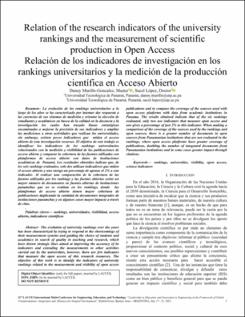El sistema se apagará debido a tareas habituales de mantenimiento. Por favor, guarde su trabajo y desconéctese.
Relation of the research indicators of the university rankings and the measurement of scientific production in Open Access
| dc.contributor.author | Murillo, Danny | |
| dc.contributor.author | López, Sucel | |
| dc.date.accessioned | 2023-08-17T13:40:34Z | |
| dc.date.available | 2023-08-17T13:40:34Z | |
| dc.date.issued | 2023-07-19 | |
| dc.identifier | http://dx.doi.org/10.18687/LACCEI2023.1.1.1347 | |
| dc.identifier.uri | https://ridda2.utp.ac.pa/handle/123456789/18064 | |
| dc.description | La evolución de los rankings universitarios a lo largo de los años se ha caracterizado por intentar responder a las deficiencias de sus sistemas de medición y guiar la elección de estudiantes y académicos en busca de calidad en la enseñanza e investigación. En donde parece que los rankings han delineado líneas estratégicas orientadas a cumplir diversos objetivos, incluida la mejora de la precisión de sus indicadores y la expansión de las mediciones a otras actividades realizadas por las universidades. Sin embargo, son pocos los indicadores que promueven o miden el acceso abierto a estos recursos de investigación. El objetivo de este trabajo es identificar la importancia de los indicadores de los rankings universitarios relacionados con la medición y visibilidad de las publicaciones de acceso abierto, y comparar la cobertura de las fuentes utilizadas en estos indicadores con otras plataformas de acceso abierto utilizadas por instituciones académicas e investigativas en Panamá. Los resultados obtenidos indican que de los seis rankings evaluados, solo dos utilizan indicadores que miden el acceso abierto, pero solo uno asigna un porcentaje de apenas el 2% a este indicador. Por otro lado, al comparar la cobertura de las fuentes utilizadas a través de los rankings universitarios y otras plataformas de acceso abierto, se identifica que las plataformas de acceso abierto tienen una mayor cobertura de publicaciones, donde casi duplican el número de documentos integrados de instituciones panameñas en algunos casos y en algunos casos tienen un mayor impacto a través de las citas. | en_US |
| dc.description.abstract | The evolution of university rankings over the years has been characterized by trying to respond to the shortcomings of their measurement systems and guiding the choice of students and academics in search of quality in teaching and research. where it seems that the rankings have outlined strategic lines aimed at meeting various objectives, including improving the accuracy of their indicators and expanding the measurements to other activities carried out by universities, however there are few indicators that promote or measure the open access of this research resources. The objective of this work is to identify the importance of the indicators of the university rankings related to the measurement and visibility of open access publications and to compare the coverage of the sources used in these indicators with other open access platforms used by academic institutions and research in Panama. The results obtained indicate that of the six rankings evaluated, only two use indicators that measure open access, but only one gives a percentage of barely 2% to this indicator, on the other hand, when making a comparison of the coverage of the fonts used. Through the ranking of universities and other open access platforms, it is identified that the open access platforms have greater coverage of publications where they almost double the number of integrated documents from Panamanian institutions in some cases and in some cases greater impact through citations. | en_US |
| dc.format | application/pdf | en_US |
| dc.language.iso | spa | en_US |
| dc.rights | info:eu-repo/semantics/openAccess | en_US |
| dc.rights | https://creativecommons.org/licenses/by-nc-sa/4.0 | en_US |
| dc.subject | rankings | en_US |
| dc.subject | universidades | en_US |
| dc.subject | visibilidad | en_US |
| dc.subject | acceso abierto | en_US |
| dc.subject | indicadores científicos | en_US |
| dc.title | Relation of the research indicators of the university rankings and the measurement of scientific production in Open Access | en_US |
| dc.type | info:eu-repo/semantics/article | en_US |
| dc.type | info:eu-repo/semantics/publishedVersion | en_US |
